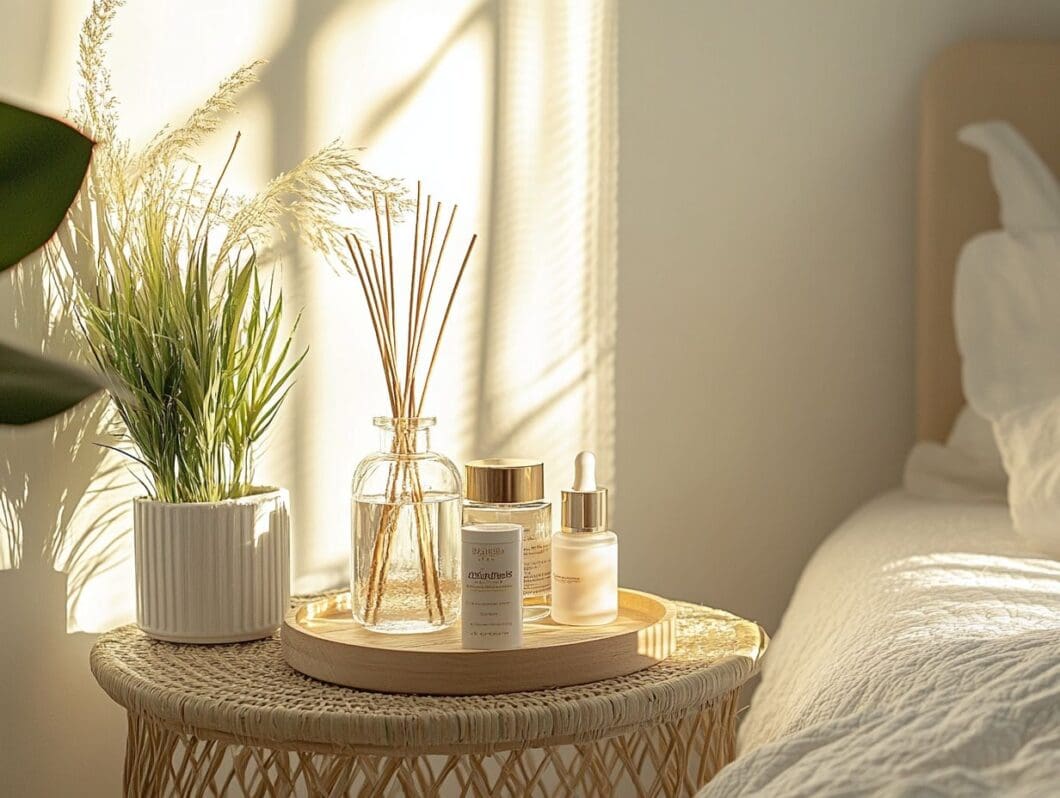A good night’s sleep is more than just a luxury; it’s a vital component of your skin’s health.
As we rest, our bodies engage in crucial repair processes that can make a significant difference in the appearance and vitality of our skin.
This article explores the effects of sleep on skin health, shares tips for an effective nighttime skincare routine, and discusses how creating a sleep-friendly environment can enhance beauty sleep.
Additionally, discover morning routines and lifestyle factors that contribute to waking up with glowing skin.
Get ready to unlock the secrets to a rejuvenated complexion!
Key Takeaways:
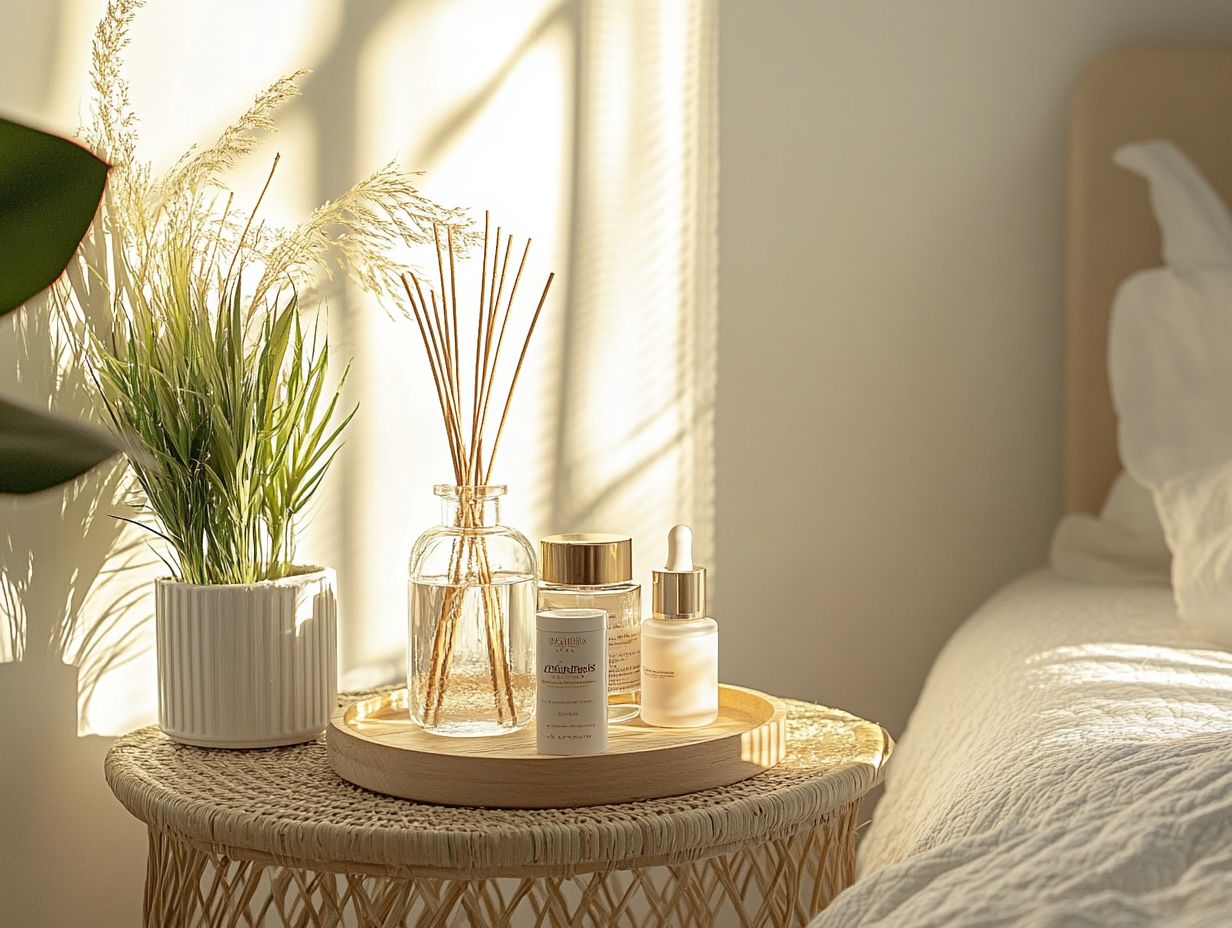
The Importance of a Good Night’s Sleep for Skin Health
A good night’s sleep is essential for maintaining skin health, as it facilitates the body’s recovery and rejuvenation of skin cells, resulting in a vibrant appearance and mitigating damage caused by daily stressors.
During sleep, the body’s growth hormones play a crucial role in skin repair and collagen production, both of which are vital for achieving a glowing complexion and preventing the formation of fine lines.
According to experts such as Dr. Ana Busquets and Dr. Susannah McClain, quality sleep significantly impacts not only overall well-being but also enhances the natural radiance of the skin.
Effects of Sleep on Skin
The impact of sleep, or the lack thereof, is significantly evidenced by common skin issues such as puffiness around the eyes and dark circles, which adversely affect overall appearance and skin hydration levels.
These visible manifestations of fatigue frequently indicate underlying hydration deficiencies, resulting in a dull and lifeless complexion. Research indicates that insufficient sleep disrupts the body’s natural reparative processes, leading to increased skin irritation and worsening conditions such as acne or eczema.
Experts, including holistic nutritionist Joy McCarthy, underscore the importance of maintaining proper sleep hygiene to promote skin health. She advocates for establishing routines that foster restful sleep, such as minimizing screen exposure before bedtime and creating a calming environment. These practices not only enhance overall well-being but also play a crucial role in attaining a radiant complexion.
Preparation for Better Skin
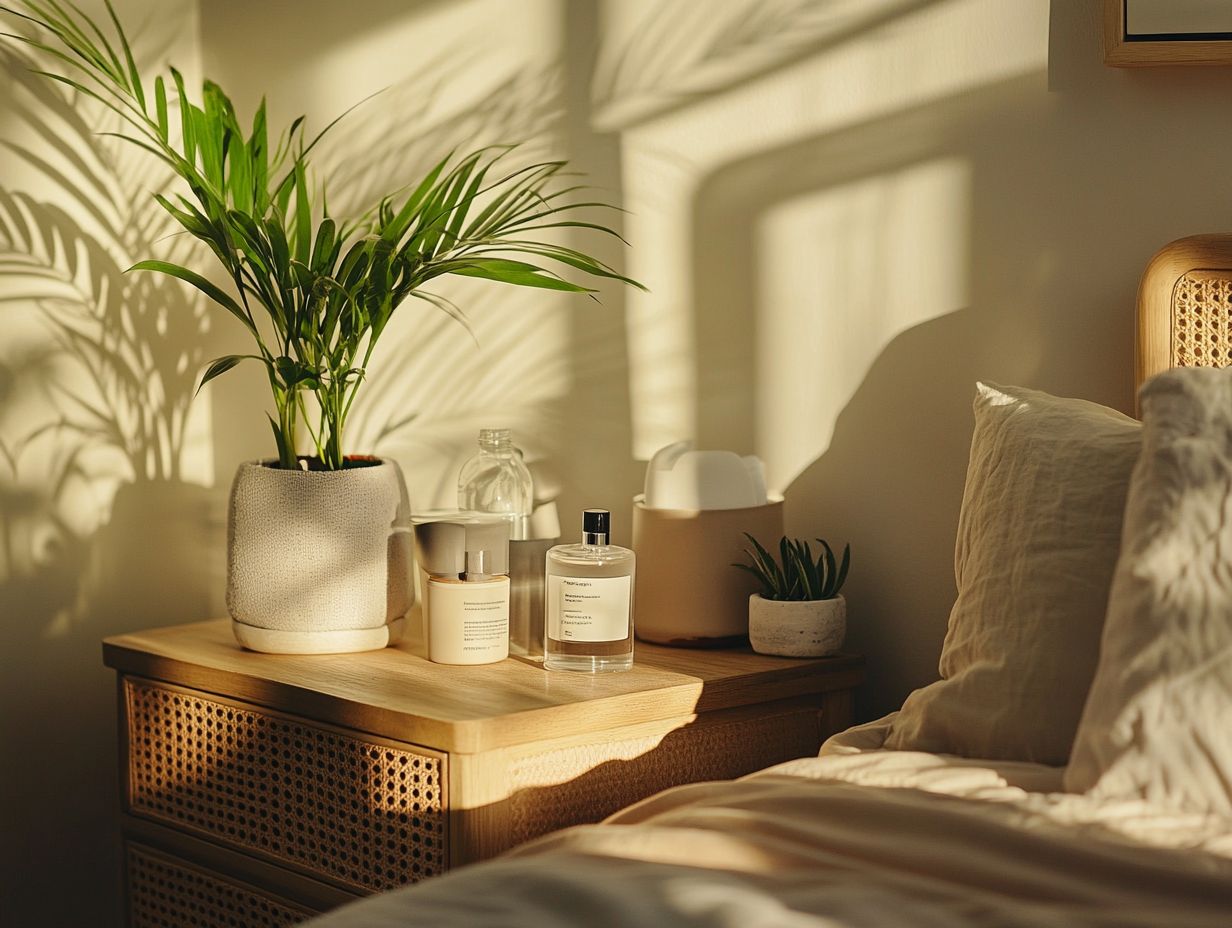
Preparing for improved skin requires the establishment of a comprehensive nighttime routine. This routine should incorporate effective skincare products, such as overnight moisturizers and gentle cleansers, which work in synergy to rejuvenate the skin during the restorative hours of sleep.
Nighttime Skincare Routine
A comprehensive nighttime skincare routine is essential for achieving clean and healthy skin. This routine should include key steps such as the removal of dirt and impurities, facial steaming, and the application of products enriched with antioxidants and retinoids.
By implementing a regimen that effectively eliminates the impurities accumulated throughout the day, individuals can significantly improve their skin’s texture and tone. Beginning with a thorough cleansing process ensures that makeup, oils, and pollutants are removed, thereby creating a clean canvas for subsequent treatments.
Following cleansing, facial steaming can greatly enhance skin health by opening the pores, which facilitates better absorption of the following products. Incorporating targeted formulations containing potent antioxidants, such as vitamin C, assists in combating free radicals and promoting a youthful appearance. Meanwhile, retinoids work to accelerate cellular turnover, thereby diminishing fine lines and enhancing overall skin rejuvenation.
This multi-faceted approach not only hydrates the skin but also nurtures it overnight, resulting in a revitalized complexion by morning.
Creating a Sleep-Friendly Environment
Creating a sleep-friendly environment is essential for enhancing sleep quality, which has a direct impact on skin health. Utilizing silk pillowcases and maintaining an appropriate sleep position can significantly contribute to hydration levels and the overall appearance of the skin.
By thoughtfully curating the bedroom to promote relaxation and tranquility, individuals can establish an environment conducive to restorative rest. Considerations such as lighting, temperature, and noise levels are critical factors in achieving optimal sleep hygiene.
Silk pillowcases, for instance, not only provide a sense of luxury but also reduce friction on the skin, thereby preventing irritation and preserving moisture. When combined with a healthy sleep position, such as sleeping on one’s back, the risk of developing sleep lines is minimized, and blood circulation is enhanced. This approach ultimately fosters a radiant complexion and ensures effective skin repair during the night.
Waking Up with Better Skin
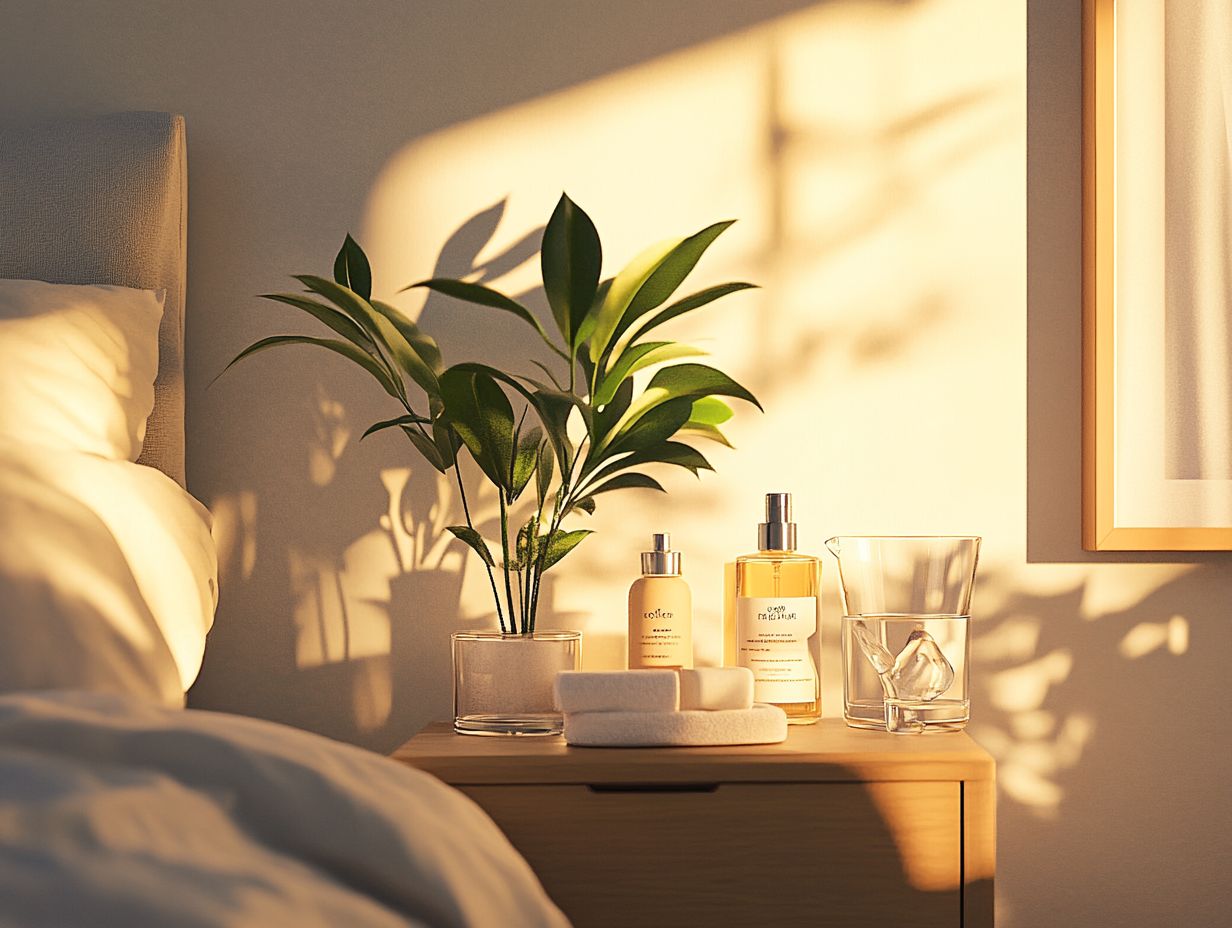
Achieving improved skin upon waking necessitates a revitalizing morning skincare routine that prioritizes the maintenance of clear skin and optimal hydration levels. This regimen should be complemented by a healthy diet that is rich in antioxidants.
Morning Skincare Routine
The morning skincare routine should commence with a gentle cleanser designed to remove any impurities accumulated overnight, followed by hydrating skincare products that promote a luminous complexion throughout the day.
This initial step is essential, as it prepares the skin for optimal absorption of subsequent products, ensuring that all active ingredients can penetrate effectively. Selecting a cleanser tailored to one’s skin type—be it oily, dry, or sensitive—can significantly enhance the achievement of a balanced complexion.
Following cleansing, it is important to incorporate a hydrating toner or essence to replenish moisture. This step not only provides hydration but also aids in balancing the skin’s pH levels, thereby preparing the skin for the application of serums and moisturizers.
Finally, locking in moisture with a high-quality moisturizer and consistently applying sunscreen can protect against daily environmental stressors, ultimately resulting in radiant and resilient skin throughout the day.
Hydration and Nutrition for Skin Health
Hydration and nutrition are essential factors in maintaining skin health; a balanced diet and adequate water intake are crucial for preserving skin moisture, while specific ingredients, such as tea tree oil, can offer additional benefits.
When individuals prioritize hydration by consuming sufficient water throughout the day, it aids in flushing out toxins and helps keep the skin plump and elastic. Nutritional choices that are rich in vitamins, particularly vitamins A, C, and E, can significantly enhance skin repair and resilience. Foods such as leafy greens, berries, and fatty fish provide powerful antioxidants that combat oxidative stress.
Incorporating omega-3 fatty acids found in flaxseeds and walnuts can contribute to a radiant complexion and reduce inflammation. Additionally, tea tree oil, recognized for its antimicrobial properties, effectively addresses blemishes and acne, making it a valuable component of a comprehensive skincare regimen.
Other Factors Affecting Skin Health
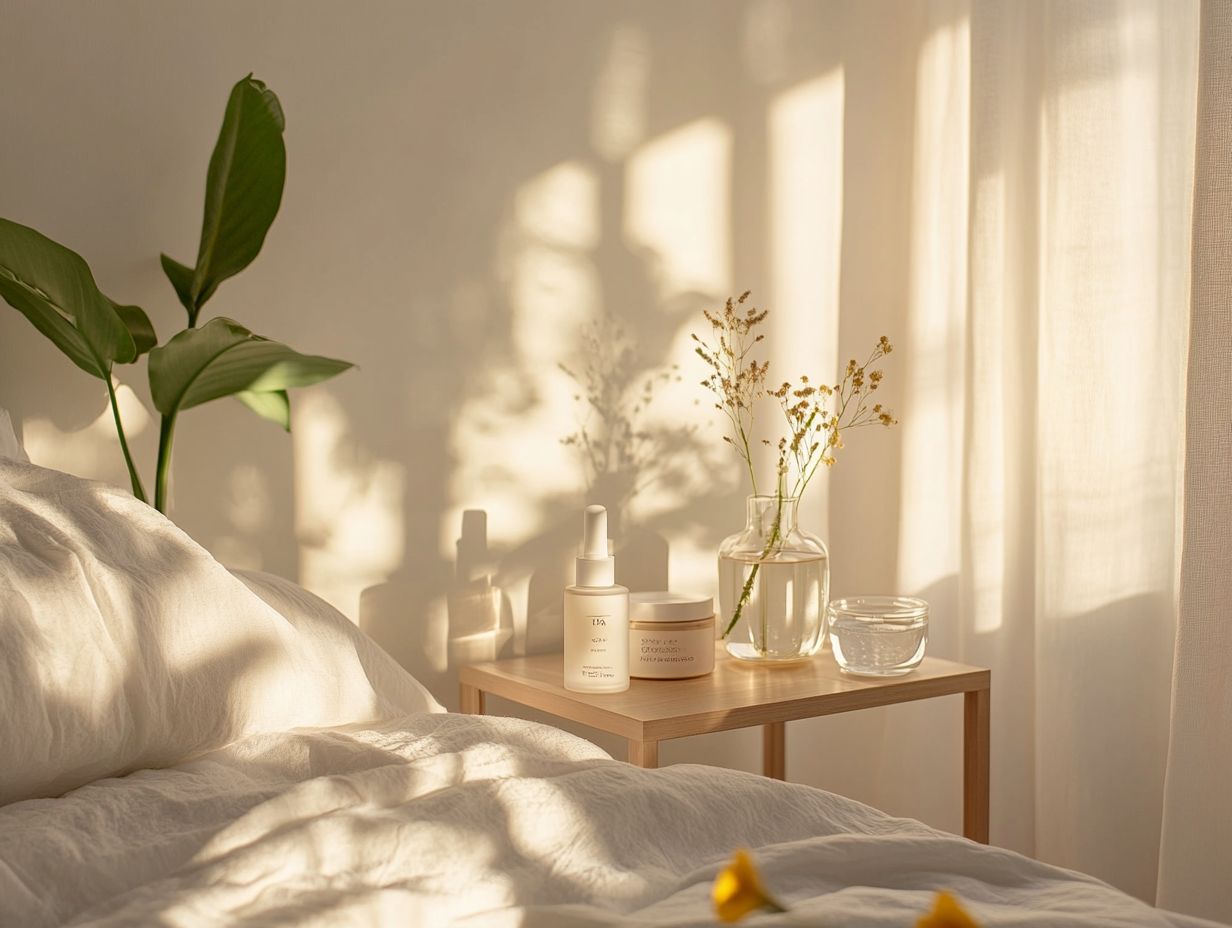
Other factors influencing skin health include effective stress management and regular exercise, both of which can help mitigate skin damage and improve conditions such as skin irritation and blemishes.
Stress Management and Exercise
Effective stress management and regular exercise are essential for maintaining skin health, acting as natural treatments for blemishes while facilitating the circulation of antioxidants throughout the body.
Incorporating techniques such as mindfulness meditation and deep-breathing exercises can significantly reduce stress levels. This reduction in stress helps prevent skin issues such as acne and eczema. Engaging in aerobic activities, such as jogging or cycling, enhances blood flow, ensuring that essential nutrients reach the skin more effectively.
Additionally, integrating yoga into a weekly routine can improve flexibility and promote relaxation, contributing to a luminous complexion.
These practices not only enhance physical fitness but also foster a radiant glow, underscoring the importance of holistic approaches for maintaining skin vitality.
Skincare Products and Ingredients to Avoid
To achieve clear skin and maintain optimal hydration levels, it is essential to be mindful of skincare products and ingredients that may cause skin irritation, particularly for individuals with acne-prone skin.
Common irritants such as artificial fragrances, sulfates, and certain types of alcohol can exacerbate breakouts and lead to unwanted redness or sensitivity. Instead, individuals are encouraged to consider gentler alternatives, including:
- Fragrance-free formulations
- Sulfate-free cleansers
- Hydrating toners containing ingredients such as hyaluronic acid and aloe vera
These soothing options not only help preserve the skin’s natural moisture barrier but also promote overall skin health, making them suitable for those seeking a clear and radiant complexion. Vigilantly examining product labels can significantly enhance skincare routines.


